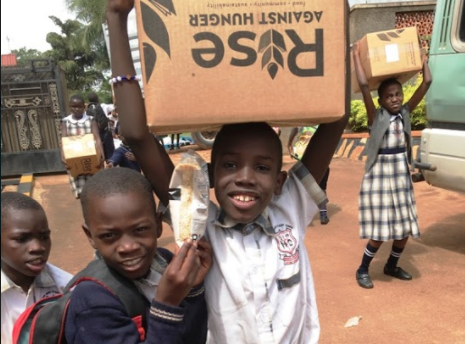
UGANDA: More than 2,300 poor youth from 3 Salesian programs receive better nutrition thanks to Rice Against Hunger rice-meal shipment
The rice-meal shipment from Rise Against Hunger improved the lives and health of students at Salesian programs in Uganda.
NEW ROCHELLE, NY (April 20, 2020) More than 2,300 poor youth across three Salesian programs in Uganda had access to better nutrition thanks to a partnership between Salesian Missions and Rise Against Hunger, an international relief organization that provides food and life-changing aid to the world’s most vulnerable. The rice-meal shipment, which was sent during the fourth quarter of 2019, was shared with Don Bosco Children and Life Mission (Don Bosco CALM) in the town of Namugongo, Don Bosco Nursery and Primary School in Bombo, and Don Bosco Vocational School in Kamuli.
The rice-meals are provided to students at schools and children at the orphanage to ensure they have the energy and focus to gain an education and participate in social programs. Don Bosco CALM welcomes and gives hope to 165 children.
“Most of our beneficiaries are from the street, HIV positive and other vulnerable children,” said Father Elie Nyandwi, director of Don Bosco CALM and the Don Bosco Primary School. “Our financial, human and logistic resources are scarcely enough. We face challenges in feeding children, paying their school fees, scholastic materials, medical assistance, and paying monthly salaries for our workers. Since we started receiving the Rise Against Hunger meals, our organization can now breathe and save some money for solving some other children’s problems.”
Rise Against Hunger partners with Salesian Missions, which works to identify needs and coordinate delivery of 40-foot shipping containers full of meals, supplemented with additional supplies when available. The partnership was developed in 2011 and since that time, shipments have been successfully delivered to 20 countries around the globe. The meals and life-saving aid have helped to nourish poor youth at Salesian schools and programs and care for those in need of emergency aid during times of war, natural disasters and health crises.
Today, 34 million people live in Uganda with half under 15 years of age. Many children and older youth have to deal with diseases such as malaria, respiratory infections, diarrhea and HIV/AIDS. The number of Ugandans living below the poverty line declined from 31.1 percent in 2006 to 19.7 percent in 2013, where it stands today.
Close to 67 percent of Ugandans are either poor or highly vulnerable to poverty, according to UNICEF. While the country has seen some economic growth, as well as improvement in its
Human Development Index ranking over the last 20 years, the country still ranks near the bottom at 163 out of 188 countries. After decades of war left many displaced, the people of Uganda face many significant challenges as they work to rebuild their country.
Uganda’s literacy rate has improved with 73 percent of the population literate but only 23 percent of Ugandans go on to acquire a secondary education. According to UNICEF, one of the biggest challenges in the country is combating the serious increase of HIV/AIDS that has left millions of children orphaned.
### Contact: media@salesianmissions.org
